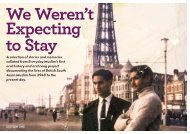Race, Faith and Community in Contemporary Britain Essays on Black, African, and African Caribbean Muslims in the UK PROUDLY MUSLIM & BLACK REPORT 2022
Black British Muslims play an important role in British society but are poorly represented in public discourse, policy, and indeed across a range of sectors. To overcome structural disadvantages and racism in society and in Muslim communities, we aim to create a platform for interventions in discourse and representation as well as in power relations. Our effort is collaborative and aimed at exploring the diversity, contributions, heritage, as well as the history of Black British Muslims. Our objective in this report is to create a platform to review and consider the current state of race and power relations, while creating networks and partnerships. In short, bringing Black British Muslim voices to the forefront is to work towards inclusion and belonging in British society and importantly, in British Muslim communities.
Black British Muslims play an important role in British society but are poorly represented in public discourse, policy, and indeed across a range of sectors. To overcome structural disadvantages and racism in society and in Muslim communities, we aim to create a platform for interventions in discourse and representation as well as in power relations. Our effort is collaborative and aimed at exploring the diversity, contributions, heritage, as well as the history of Black British Muslims. Our objective in this report is to create a platform to review and consider the current state of race and power relations, while creating networks and partnerships.
In short, bringing Black British Muslim voices to the forefront is to work towards inclusion and belonging in British society and importantly, in British Muslim communities.
Create successful ePaper yourself
Turn your PDF publications into a flip-book with our unique Google optimized e-Paper software.
Experiences of a first-year teacher
As a proactive, determined, newly qualified teacher in 2015 searching to secure a steady
income, I opted to work as a supply teacher on a long term contract. This is different to being
employed directly by the school authority. Supply teachers work through agencies which act
as the employment intermediary between a school and a teacher who is deemed as a casual
worker.
I went through a rigorous interview (I was the fourth teacher presented by my agency) for the
position of a Year 1 teacher and passed their criteria. When I was hired, I agreed to work on the
condition that I will be supported for my NQT year, which the school was pleased to accept.
In this essay, I consider race, class, and gender in the experiences of Black Muslim female
teachers. Three teachers’ experiences, including my own, reveal how Black Muslim teachers
in Britain encounter prejudice and discrimination.
However, trouble loomed from my first day of teaching at the school. While some parents were
welcoming and were willing to work with me, I encountered many hostile and very abrupt
parents. I later learnt that I had become the topic of vicious gossip on the parents WhatsApp
chat - a platform through which some of the neutral parents’ minds were changed by the nasty
stories they spread about me. Some of the misconceptions were that I wasn’t a good teacher,
that I shout at children, and that the children are scared of me. Instantly, emails from parents
flooded the school while some came in physically to lodge complaints about me. My classroom
turned into a place of observation where parents were brought in to see my interaction with
the children. Each visit, albeit without my knowledge and consent, yielded the same outcome
as each time the parents came to my class, they met their children fully engaged in activities.
The students only acknowledged their parents’ presence by waving at them and carrying on
with their activities. “He’s having fun” and “she’s immersed in her activity” were examples of
parent’s comments each time they visited as they witnessed the connection and relationship
that I formed with their children.
To say there was excessive pressure on me would be an understatement. I was under constant
pressure to prove my capability to the school management and to disappoint the hateful
parents who constantly sought but didn’t find flaws in what I did. I constantly demonstrated the
required knowledge and professional skills in my duty, I taught as prescribed by the school’s
policy and was efficient and up-to-date in my NQT targets. In addition to the regular routine
observations and learning walks, I had my first formal observation and passed. There was
clear evidence that I knew what I was doing, the progress was obvious in books and children
showed progress in their learning.
In my discussions with staff at the school, I realised that the two other NQTs (of Australian
origin) were not subjected to the rigorous observations and visits like I was having because
parents didn’t object to their teaching. However, it was very difficult to accuse the school
of any abnormalities as they could claim that all the observations were ways to support me.
For the fact that I was doing very well in most strands of the Teaching Standards, I reassured
myself that there was no basis of pinning an incapability label on me.
A two-day parents’ evening was slated for December and the conversation with parents at the
meeting was a perfect moment for my realisation and validation that my experience was just
148 149





